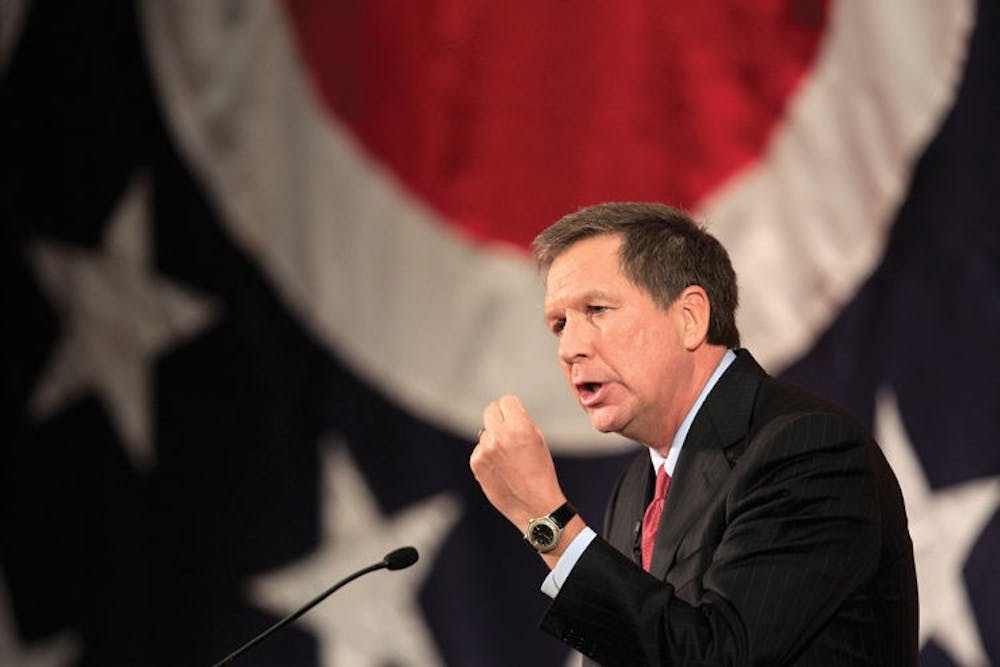The debate comes just less than a month before the first Democratic debate.
Ohio Gov. John Kasich and 10 other Republican contenders for president spoke on Planned Parenthood funding, marijuana legalization, vaccinations and a swath of other topics at Wednesday night’s GOP Debate.
The debate, moderated by CNN anchor Jake Tapper, took place at the Ronald Reagan Presidential Library in Simi, California.
After an introduction from each candidate, moderators asked businesswoman Carly Fiorina whether she would trust candidate Donald Trump with the nation's nuclear codes, in light of Fiorina labelling Trump an "entertainer."
When pressed on the question, she said couldn’t offer an answer.
"That’s not for me to answer,” she said. “It's for the voters to answer.”
Sen. Rand Paul, R-KY, responded that he would be "very concerned" if Trump were in charge of the nuclear codes.
Trump responded by saying Paul "shouldn't even be on this stage."
Kasich called for the moderators to shift the focus away from those confrontations.
"If I were sitting at home watching this back and forth I'd be inclined to turn it off," he said.
{{tncms-asset app="editorial" id="e1801ca2-4a9e-11e5-833b-c74ba993a28e"}}
Later in the night, moderators asked Sen. Ted Cruz, R-TX, about his support for Kim Davis, the county clerk in Kentucky who refused to grant same-sex marriage licenses.
"The Supreme Court in a very, very divided decision decided out of thin air that they were going to redefine marriage," Cruz said.
Cruz also argued Davis was denied some of the same religious liberties granted to Guantanamo Bay prisoners.
Moderators later asked Kasich about defunding Planned Parenthood.
Although he supports defunding Planned Parenthood, Kasich said he disagrees with a movement in U.S. Congress, led by Cruz, to oppose a government spending bill that includes funding for the organization.
If that bill does not pass, it could lead to another shutdown of the federal government.
Hugh Hewitt, political commentator for the Salem Radio Network, asked Kasich to comment on his refusal to attack Democratic opponent Hillary Clinton.
Kasich said he wanted people to get to know him first before he begins attacking any competitors.
“Don't worry about me and Hillary,” he said. “That will all work out, and I'm from Ohio. She will not beat me there, I can promise you that.”
Candidates also debated the issue of marijuana legalization, which may be a ballot issue in Ohio in this year Nov. 3 elections.
Rand Paul argued that the “war on drugs” unfairly targets people of lower social standing.
“Personally I think that this is a crime for which the only victim is the individual,” he said.
He said he advocated for rehabilitation over incarceration for those affected by drug abuse.
He said “at least one” of the candidates onstage had admitted to smoking marijuana in the past, and claimed that it was hypocritical for someone to be able to say that and oppose marijuana legalization.
Former Florida Gov. Jeb Bush said he smoked marijuana once over forty years ago, but that drug abuse issues were too extensive in America to let up on the war on drugs.
“Here’s the deal, we have a serious epidemic of drugs that goes way beyond marijuana ... if you look at the problem of drugs we have today, it’s a real problem,” he said.
At the close of the debate, Kasich made a case for limited government, with a greater emphasis on state and local controls.
“America was never great because we ran America from the top down,” Kasich said. “America was great because we ran America from the bottom up, where we lived in the neighborhoods.”
@wtperkins
wp198712@ohio.edu






